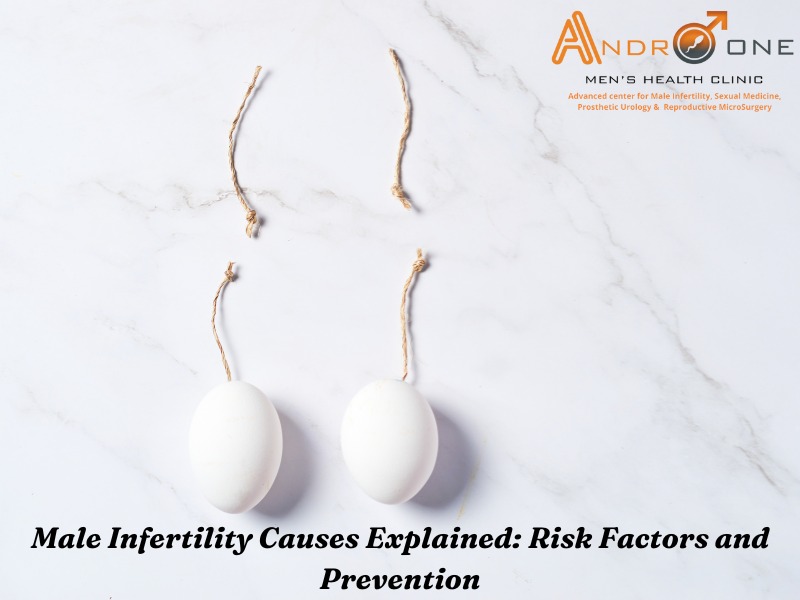Male Infertility Causes Explained: Risk Factors and Prevention
Male infertility has been the age-old general problem for most couples across the globe. In simple words, male infertility refers to the man not being able to contribute toward conception. Many times, it can be prevented by following certain steps. Hence, knowing the causes and risk factors acts as the door opener toward prevention. Common Causes of Male Infertility Several reasons can affect male infertility. One of these is low sperm production, which reduces the possibility of successful fertilisation. Furthermore, issues in the motility of sperm also impact the process. Moreover, if the sperms are moving in the wrong direction, the opportunities of successful fertilisation are very slim. The second thing that influences the fertilising capacity is the sperms’ shape. Sperms that are abnormally shaped will not find or enter the egg. Furthermore, the next primary reason for male infertility is hormonal imbalance. These disorders lead to some degree of lower or higher levels of some specific hormones that negatively influence the production and performance of sperms. For example, low testosterone levels indicate decreased fertility. However, some medical conditions frequently affect fertility; these include varicocele. Varicocele is the swelling of veins in the scrotum. This condition disrupts blood flow, along with increased temperature, and affects sperm quality. Infections are another cause of male infertility. Infections can cause an obstruction or damage to any reproductive organ. Certain infections even affect the production of sperm. Sexually transmitted diseases are very harmful. They result in long-term fertility problems if they are not treated. Risk Factors of Male Infertility Lifestyle factors play a major role in male fertility. For example, smoking reduces the quality of sperm. Smokers have lower counts in their sperm. Additionally, excessive alcohol consumption will also hurt the production of sperm. Drinking beyond what is recommended can cause hormonal imbalances and infertility in men. Another risk factor is environmental toxin exposure. Pesticides and chemicals damage sperm production. However, the greatest danger is the extended period of industrial chemical exposure. Radiation also causes damage to sperm-producing cells. The risk of infertility also includes being overweight. Excess fat can contribute to hormonal imbalance, where sperm quality is adversely affected. Additionally, frequent exposure to hot tubs can be a factor in sperm production. The scrotum needs a cooler environment to produce optimum sperm. Men who are over 40 have a consequent drop in sperm quality. This means that while sperm count may be positive, conception may not take place with even healthy partners. Prevention Tips for Male Infertility Male infertility may be avoided by maintaining a healthy lifestyle. Quitting smoking is one of the foremost processes. Smoking contributes to decreased sperm count and motility. Therefore, alcohol consumption can also be reduced to enable hormonal balances to resume. Maintaining a healthy weight is very important. Regular exercise and a healthy diet improve general health. Hydration and antioxidant foods further enhance sperm health. Additionally, all the essential nutrients come from foods like fruits, vegetables, and nuts. Harmful chemicals must also be avoided. Protective equipment in the workplace prevents harmful exposure to chemicals. Additionally, the infrequent use of hot tubs and saunas prevents the warming of testes and results in low-level damage to sperm production. Healthy sperm is an absolute necessity for cooler scrotum temperature. Stress should also be kept within limits. Higher levels of stress often lead to hormonal imbalances. This can be prevented by using relaxation techniques such as yoga or meditation. However, having sufficient sleep produces healthier sperm when well-rested. Medical Treatment for Male Infertility Sometimes, changing your lifestyle is not enough to treat infertility. If this is the case, then it might be best to find a specialist who can provide the right information and treatment. The best Andrologist in Namakkal can help one find the right solution and treatments. An andrologist is particularly concerned with the diagnosis and treatment of male factors of infertility. For conditions that do not improve with lifestyle changes, then medical methods come to attention. Hormonal imbalances can be corrected through hormonal therapies. Surgery might be required for cases of varicocele. Therefore, infections that affect fertility can also be cured using medications. Men having sex-related health issues should avail their services from the Best Sexologist in Salem. Sexologists are recommended to advise to enhance sexual health and fertility. Pro-seeking guidance ensures that the root causes of infertility are treated. Role of Experts in Male Infertility Choosing the right health expert is extremely important when wanting to treat infertility. The Experts in Andrology and Men’s Health in Tamilnadu offer comprehensive care. Being well enlightened with the distinct needs of men who are facing infertility, they can recommend unique packages or custom-treatment plans. This approach increases one’s chances of overcoming infertility. Relief can also be availed of by visiting a Men’s Sexual Health Clinic in Tamilnadu. These clinics specialised treatments related to male infertility and other sexual health concerns. Professional assistance is the only way to diagnose and treat fertility problems; they have treated the patient with a range of services from testing to advanced treatments. Conclusion Male infertility is a condition that is quite complicated. Causes may be diverse, so becoming aware of the risk factors can keep people with this condition prepared to protect themselves from further damage. Changes in lifestyle and consultation with doctors will help find a way to enhance fertility. It is possible to overcome male infertility with support. Always see a specialist with persistent issues since early interventions lead to better results.

